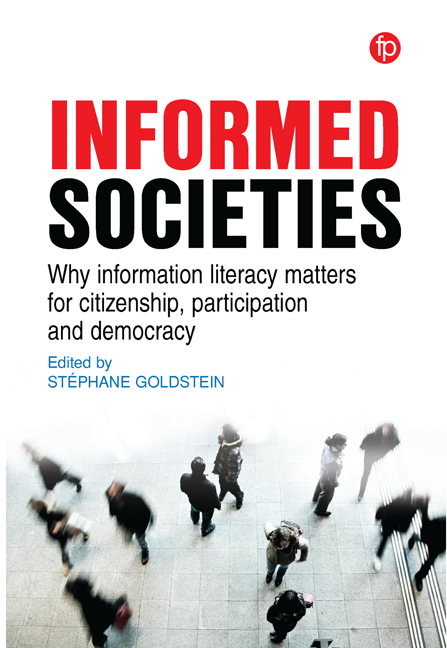Book contents
- Frontmatter
- Contents
- Figures and Tables
- Notes on the authors
- Foreword
- Introduction
- 1 Information Literacy in the Digital Age: Why Critical Digital Literacy Matters for Democracy
- 2 The Discourses of Power, Information and Literacy
- 3 What Intellectual Empathy Can Offer Information Literacy Education
- 4 The ‘Post-Truth’ World, Misinformation, and Information Literacy: a Perspective From Cognitive Science
- 5 Media and Information Literacy: Intersection and Evolution, a Brief History
- 6 Information Literacy and National Policy Making
- 7 Information Literacy as a Growth Pillar for a Fledgling Democracy
- 8 Information literacy and the Societal Imperative of Information Discernment
- 9 Libraries and Democracy: Complementarity in a Regime of Truth
- 10 Scottish Public Libraries Welcome Syrian New Scots: a Transition from Being a Refugee to Becoming an Active Part of the Community
- 11 Information Literacy, Lifelong Learning and the Needs of an Ageing Population
- Index
Introduction
Published online by Cambridge University Press: 22 February 2020
- Frontmatter
- Contents
- Figures and Tables
- Notes on the authors
- Foreword
- Introduction
- 1 Information Literacy in the Digital Age: Why Critical Digital Literacy Matters for Democracy
- 2 The Discourses of Power, Information and Literacy
- 3 What Intellectual Empathy Can Offer Information Literacy Education
- 4 The ‘Post-Truth’ World, Misinformation, and Information Literacy: a Perspective From Cognitive Science
- 5 Media and Information Literacy: Intersection and Evolution, a Brief History
- 6 Information Literacy and National Policy Making
- 7 Information Literacy as a Growth Pillar for a Fledgling Democracy
- 8 Information literacy and the Societal Imperative of Information Discernment
- 9 Libraries and Democracy: Complementarity in a Regime of Truth
- 10 Scottish Public Libraries Welcome Syrian New Scots: a Transition from Being a Refugee to Becoming an Active Part of the Community
- 11 Information Literacy, Lifelong Learning and the Needs of an Ageing Population
- Index
Summary
This book is for anyone who cares for informed participation in society. It is for any reader, anywhere in the world, who suspects or recognises that inclusive societies function best when their members have the means, capability and confidence to make the most out of the information that they encounter on a daily basis. In this sense, it deals with the capacity of human beings to achieve genuine autonomy. The book is for individuals who feel that engaged citizenship thrives on informed, evidence-based views of the world. It is for anyone interested in reinforcing, reinvigorating and deepening democracy in the face of the dangers represented by misinformation and attempts to deceive – whatever the nature and the source of the deception. But at the same time, the book is absolutely not intended as an arcane treatise for experts, and although it is written with academic rigour, it is accessible, engaging and deliberately provocative. And whilst recognising many worries, difficulties and obstacles, it is ultimately optimistic about the ways that a well-informed citizenry can underpin healthy, lively democratic systems. Such is the gist of informed societies.
So, in the light of this, why information literacy, and how does it fit in? It was in 1974 that Paul Zurkowski first explicitly suggested the concept of information literacy (Zurkowski, 1974). He framed this simply as the abilities to use information tools to mould information solutions that address the problems of individuals. Although this view was set out in the pre-internet age, 45 years on, the inference remains valid: information literacy is a means of helping people to address their information needs, which are as varied as the life experiences and aspirations of individuals. This variety reflects many if not all aspects of people's lives: in education, in work, in leisure, in creativity, in well-being, in addressing financial and material needs. And one further, crucial part of this variety is the relationship with an important aspect of human endeavour: people's ability to function and take part in society, to contribute to shaping its rules and conventions, to take advantage of the opportunities for participation that democracy entails and, just as significantly, to create new opportunities for engagement and participation.
- Type
- Chapter
- Information
- Informed SocietiesWhy information literacy matters for citizenship, participation and democracy, pp. xxiii - xxxPublisher: FacetPrint publication year: 2019



